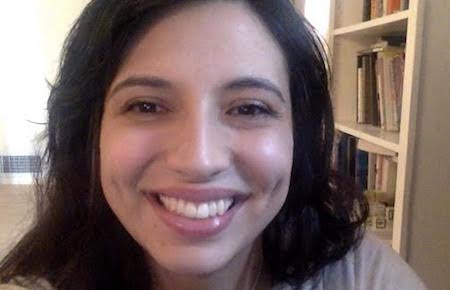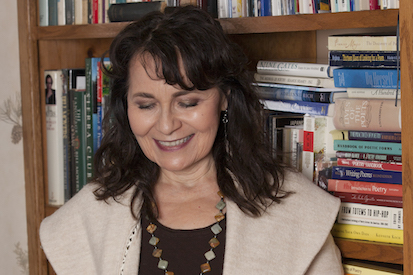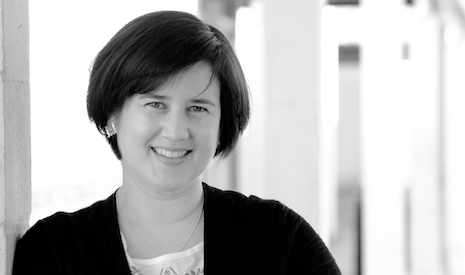In my Mojave culture, many of our songs are maps, but not in the sense of an American map. Mojave song-maps do not draw borders or boundaries, do not say this is knowable, or defined, or mine. Instead our maps use language to tell about our movements and wonderings (not wanderings) across a space, naming what has happened along the way while also compelling us toward what is waiting to be discovered, where we might go and who we might meet or become along the way.
This feature of indigenous women is meant to be like those song-maps, to offer myriad ways of “poetic” and linguistic experience—a journey through or across memory, or imagination, across pain or joy or the impossibility of each, across our bodies of land and water and flesh and ink—an ever-shifting, ever-returning, ever-realizing map of movement, of discovery, of possibility, of risk—of indigenous and native poetry. It is my luck to welcome you to this indigenous space and invite you into the conversations of these poems, languages, imageries and wonders. In the first installment of this bi-monthly feature, I’m pleased to share the work of Laura Da’, Kimberly Blaeser, Heid E. Erdrich, and Kat Page (full bios below).
–‘Ahotk, Natalie Diaz
*

Heid E. Erdrich
Sovereign Love
When I look upon the beloved, the real beloved, not the beloved of memoirs, made up in revenge, but the active generator of love, the love maker. When I when
When I look upon you.
Beloved, I might avert my gaze, let it stray only to your hands and then up to your throat. It is only in holding your eyes away from mine that I can stay sovereign in my love. It is only for you. Not from you. It is more than state or nation. This love is itself unto itself. The only name it needs it speaks within me. Call it what you will. It will answer.
Public Grief
This is not my grief
but a small hole lightless
penetrating the globe of family
so now all stands still
ringed by light snow
ringed by bright lights
This is not my grief
but a lightless hole through the human globe
surrounded by cameras yammering
brilliant stills and stunned silence grown so loud
it weighs down the flowers
daisies carnations lilies mums
all the flowers ever
left in memorial along with
all the letters and petitions
and again the promise of never
This is not my grief
but a small hole lightless
penetrating the light show
the weight of all-the-ever flowers
cameras and microphones
speechless unspeakable there are no words
but words and words and words
This is not my grief
but a black and white vortex a crush
that collapses sucks in swallows whole
This is not my grief but
a terrible a particular
a small hole deep beyond belief
deeper deep enough
to own its depth
to be depth alone
How
Loves How I love you How you How we hang on words How eaten with need How we need to eat How weevils sift the wheat How cold it is How thick with hoarfrost ice slick sleet freeze How wintery the mix How full of angst How gut sick How blue lipped How we drink How we drink a health How we care How easy over as eggs How it all slides How absurd How yet tender we all How wrapped in a thick coat How battered How slender the flesh How we wrap ourselves How many selves we all How I miss you many How I see you How your eyes warm mine How tiny am I inside How enormous my need How you open an old-fashioned satchel How deep it yawns How bleak this need How like winter How it yet catches the light How brilliant the sundogs parhelion moondogs paraselene phenomenon optic How fetching your spectacles How my thumbs might fit alongside the slope of your nose How my own glasses slide down my thin bridge How ridiculous the theory of the bridge How inane the bibble babble How we grew to be friends How we grew thumbs How opposable we all How we grew sparks How we blew up a fire How angry How incensed How we resist How we bead up drops How water will not run How we distract How loud the dog snores How loudly How noisy the snow grows How many degrees below How we fret How again How we all came here How did we come How did we How loves How did we come to this

Kat Page
Because Life Coos, Cariño,
let’s light up the sky.
The roof and the rockets are ours.
Soccer is on,
we circle into different bars
to watch.
After cliff diving, I sold my bike.
I couldn’t ride it all the way to
New Mexico.
You hug me even though I’m
not from here anymore,
not D.C.-black-and-red-and-
three-stars all over,
you kiss my check
and take me to dance.
It builds a bird of light in me,
that bird will reach the roof
to ask for water—
God will send it from heaven, no?
They tell me your fiancé found you
hanging
from some other kind of sky,
feet off the ground.
There is no other ground than the
one you lift yourself from,
no other sky than the
one you press your head against
filling
your whole body
with yes and again.
Angel Smoking Winston Lights
The rosary hung around my neck,
large wooden beads painted every color
with a red cross in the center.
What is a wing if it can’t be set on fire?
His wings weren’t a fluff of the cloud—
they were tobacco leaves sown together,
The stitch uneven and wide.
Who gave you a full set of teeth?
It was my own head they grew from
one after another like a dog’s hot mouth.
The angel who stands by my bed is maybe a man
shirtsleeves extending from his tobacco-wings.
He was eighteen when he traveled to Russia—
saved all his money from his fast food job.
The angel says I’m his blue bowl with buttered toast inside.
The sun is too close to the earth today,
everyone’s wings may melt today,
today, not even a father’s warning can save his children.
We stay inside and hope for a breeze to move the rocking chair.
Stay inside.
We’re already inside.
The other inside.
Before I know it I’m in his heart.
All there is, is sand there.
Sand cleaning sand.
His kitchen door’s open,
he’s in the backyard,
his dog is running with a full set of teeth.
I want to touch everything
but he says being here already means touch.
It’s a dry season and
there are blue and red walled borders,
and they’re never in the same spot,
people keep slipping past them.
He never pushes people to come or stay or go,
but they’re here and they make dishes dirty.
They leave and trash is everywhere.
The wind has to blow to clear him out.
The wind brought me,
I won’t slip past but slip in,
egg-shaped and lonely on a wall waiting to fall,
he wonders if he can still sandwich his heart over mine.
We were too close before and that closeness has stopped all hands,
that closeness has stopped all talking,
that closeness has made even breathing in the same room
a form of touching.
Ask me to go outside.
If we can’t touch, ask me to go.
Borders are born to escape themselves—
there’s the sound of a helicopter or
the sound of one window open while driving on the highway,
the sound (we know) of getting away—
![]()

Kimberly Blaeser
When We Sing Of Might
i.
In this part I switch clothes with a woman I just met
shed my metal and pray to the scanner gods.
I walk freely through each lock, each clanging door;
here the prison air, the elastic waist of her patterned skirt
settle like a new identity around my body.
ii.
This is the part where it used to be game—a child
moving like a worm through the blades of cool,
through soft evening grass. Firecrackers our only sin.
From here I watch the patrol car, count to ten to twenty,
count the pointed edges of a star driving by,
remember the chorus about sin and error pining—
hold my breath, spend an old longing born of beer,
born of bible talk and men.
iii.
This is the year when no one followed the tin star
or the wonder star of Christmas hymns,
when the trail between the courthouse and my grandma’s
grew shorter and everybody’s hands got tired
picking the rice clean enough for baby Jesus,
clean enough to sell at the Model Meat Market
on Main Street where all the cars parked on an angle,
and I used to think the sign said “angel parking”
and I wondered who would park an angel
if they could find one.
iv.
Right here weary world I park the flashbacks
about all the arrestable moments—a past of illegal
brown bodies eating out of season, boys the wrong color
for love, a past of too many: fish, fists, and bottles
broken, the brown drip of spilled brandy—arrestable
edges of lives made jagged and dangerous
(His law is love and His gospel is peace)
star-jagged and dangerous as the moments where I see
and maybe you do too the faces sharpened
into angles of rage, of disgust sharpened
on all the low-wage jobs and lying songs
their children learned in grade school
and sang at concerts with fingerplay
and warm kool-aid, when we all still drank
the kool-aid and believed the liberty lyrics—
(and in His name all oppression shall cease).
This is the part where arrestable moments
could go either way—and do
depending upon the time of night
the county and the star-wearing body.
So that quiet grass and breath-holding
was training. That counting, one to ten,
ten to twenty—this is where
seconds can become years for some
when it goes the wrong way
when they are the wrong color
when their pockets are empty
when liberty and justice for all—is all used up.
v.
But when we sing of might, this is the part
the part where my jailed brown uncles
my shackled cousins angel their way in
where children fostered and lost reappear.
I dress in their stories patterned and purple
as night. I dress in old songs of prison trains
and men covering their eyes to sleep,
songs of women on one side of a sliding panel
of lives shattered but mosaiced by might—
the angles of survival a many-cornered wholeness.

Wellspring: Words from Water
A White Earth childhood water rich and money poor.
Vaporous being transformed in cycles—
the alluvial stories pulled from Minnesota lakes
harvested like white fish, like manoomin,
like old prophecies of seed growing on water.
Legends of Anishinaabeg spirit beings:
cloud bearer Thunderbird who brings us rain,
winter windigo like Ice Woman, or Mishibizhii
who roars with spit and hiss of rapids—
great underwater panther, you copper us
to these tributaries of balance. Rills. A cosmology
of nibi. We believe our bodies thirst. Our earth.
One element. Aniibiishaaboo. Tea brown
wealth. Like maple sap. Amber. The liquid eye of moon.
Now she turns tide, and each wedded being gyrates
to the sound, its river body curving.
We, women of ageless waters, endure;
like each flower drinks from night,
holds dew. Our bodies a libretto,
saturated, an aquifer—we speak words
from ancient water.
![]()

Laura Da’
First Born
Rawhide straps stiffen
around the stump
of a patchy haunch.
A salt-lick deer
hangs split
over the saddle’s pommel.
The animal’s blood
fused with rain soak and sweat
runs down in rivulets
to the gray mare’s muddy fetlocks.
Game is scarce
but the long ride shakes
more flavor into the hanging meat,
already savory from within.
Lazarus trots out
of the prairie fringes
of post oak and blackjack
and into the farm from behind
as heat dries his mare’s
coat into pink-larded waves.
Wisps of stone fruit scions
loll in the back rig
of the oozing meadow.
His wife holds a long stick in one hand
honed at the end for boring holes.
She rests against an outcrop
of beehive sandstone
and with her spare hand
braces the round thigh
of Lazarus’ first born
who squirms to be let down.
He watches her prod the ground
for snake holes and then
walk the baby across it.
Rich, feathery belts of timber
snake lavender in dusky light
through the buttery bottomland.
When his wife drops the stick
and draws the child
into her arms,
the baby rests his head
reflexively on her chest,
her lips bend to his crown.
He rides close enough to see
the tracery of the baby’s slim veins
and dark wisps of hair
that flash across the bib
of his wife’s faded calico dress.
The deer’s hooves tick across
the tip of the saddle horn
as Lazarus dismounts
and heaves it down.
*
Onion Skin
Portents of fierce winter
undermined by movement:
the age-old songs
of chill warning
grow sparse
over stretched miles and
vexing meridians.
Corn that sprouts lushly
then offers abundant ears
on the banks of the Scioto
gives way
to the thin skins
of allotment onions
along the lower banks of the Kaw.
A subtle conjuring
winds under the skin
when the tract
severed in twain
twangs within the body;
new lots break
into fractions
alongside the nations.
Each move carves
this tribe in half,
so that one hundred arrive
onto the newest allotment
of the thousand
who walked from Ohio.
Lazarus, his wife
and three of their children
drop a loose square
of foundation logs —
36°50′25″N 94°36′36″W
The season’s last walnut leaves
scattered on the ground
to discourage the mice.
A prairie wolf
at the edge of the camp,
grows bold enough
to gnaw at the dried blood
that still clings
to the saddle’s rawhide ties.
Lazarus stands fireside,
splicing the hemp rope
at the end of a lariat,
and pinching out sparks with the pad
of his thumb and finger.
Some say an onion,
halved and burned
black over hardwood
then pressed
to the torso
will lift the wet rack
of consumption.
When the first spring breaks,
the survivors
wear a layered blister
straddling the hollow of their chests;
green corn sprouts slender.
![]()
Heid E. Erdrich is Ojibwe enrolled at Turtle Mountain. She is the author of five poetry collections, most recently Curator of Ephemera at the New Museum for Archaic Media. Heid works as an interdisciplinary artist and scholar, a visual arts curator. She edited the anthology New Poets of Native Nations forthcoming from Graywolf Press. Her collaborative award-winning poem videos and animations are created with an all-indigenous crew. She teaches in the Augsburg College Low-residency MFA in Creative Writing program.
Kat Page is mestiza; born and raised in Albuquerque, New Mexico. Her work has appeared in Prairie Schooner, B O D Y, Inch, Boxcar Poetry Review, Verse Daily, Otis Nebula, Tidal Basin and Cutthroat among others.
Kimberly Blaeser is a Professor of Creative Writing and Native American Literature at University of Wisconsin—Milwaukee and MFA faculty member for the Institute of American Indian Arts in Santa Fe. The author of three poetry collections, most recently Apprenticed to Justice, Blaeser served as Wisconsin Poet Laureate for 2015-16. She is Anishinaabe, enrolled at White Earth Reservation.
Laura Da’ is a poet and public school teacher. A lifetime resident of the Pacific Northwest, Da’ studied creative writing at the University of Washington and The Institute of American Indian Arts. Da’ is an enrolled member of the Eastern Shawnee Tribe of Oklahoma and a recipient of the Native American Arts and Cultures Fellowship. She is the author of Tributaries, a 2016 American Book Award winner,and a chapbook, The Tecumseh Motel. In 2015, Da’ was a Made at Hugo House Fellow and a Jack Straw Fellow. Da’ lives near Seattle with her husband and son.













